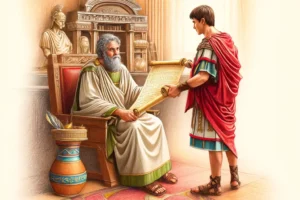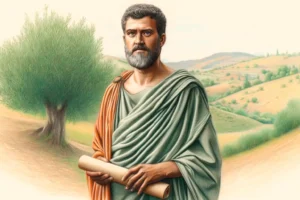
Cornelius, a Roman centurion
Cornelius, a Roman centurion, is known for being the first Gentile convert to Christianity, highlighting the early church’s expansion beyond Jewish boundaries.
Quick Facts
- Roman Centurion: Cornelius was a centurion in the Roman army, stationed in Caesarea.
- God-fearing Man: He was devout and known for his piety and generosity to the poor.
- Vision of an Angel: Cornelius received a vision instructing him to send for the apostle Peter.
- Peter’s Vision: Concurrently, Peter had a vision that led him to understand that the Gospel was for all people, not just Jews.
- Holy Spirit: Cornelius and his household received the Holy Spirit, signifying God’s acceptance of Gentiles.
- Baptism: Cornelius and his household were baptized by Peter, marking a significant moment in early Christianity.
Historical and Cultural Context
Cornelius, a Roman centurion, is introduced in Acts 10. As a centurion, he commanded about a hundred soldiers, indicating his position of authority and respect within the Roman military. Caesarea, where he was stationed, was a significant Roman city on the Mediterranean coast, serving as a hub of Roman administration and military operations in Judea.
Religious Background
Despite being a Gentile, Cornelius is described as a “God-fearing” man (Acts 10:2). This term was used for Gentiles who adhered to certain aspects of Judaism, such as worshiping the God of Israel and observing some Jewish customs, without fully converting to Judaism. Cornelius’s devotion is evident through his prayers and acts of charity, earning him respect among the Jewish community.
Divine Encounter
Cornelius’s life changed when he had a vision of an angel of God (Acts 10:3-6). The angel instructed him to send for Simon Peter, who was in Joppa. This vision highlights God’s initiative in breaking down the barriers between Jews and Gentiles, showing that the message of Jesus was meant for all humanity.
Peter’s Vision
Simultaneously, Peter experienced a vision (Acts 10:9-16) where he saw a sheet filled with various animals, both clean and unclean according to Jewish dietary laws. A voice told him to kill and eat, but Peter resisted, citing Jewish law. The voice responded, “Do not call anything impure that God has made clean.” This vision prepared Peter to accept Gentiles as part of God’s plan, indicating that the ceremonial laws separating Jews and Gentiles were no longer a barrier in Christ.
Meeting of Cornelius and Peter
Obeying the angel’s instructions, Cornelius sent his servants to bring Peter to Caesarea. When Peter arrived, Cornelius fell at his feet in reverence, but Peter lifted him up, emphasizing that he was just a man (Acts 10:25-26). Peter’s entry into a Gentile’s home broke Jewish tradition, symbolizing the new covenant’s inclusivity.
The Holy Spirit’s Confirmation
As Peter preached to Cornelius and his household, the Holy Spirit came upon all who heard the message (Acts 10:44). This was a pivotal moment, as the Jewish believers with Peter were astonished that the Holy Spirit was poured out even on Gentiles. The speaking in tongues and praising of God mirrored the Pentecost experience, confirming God’s acceptance of Gentiles.
Baptism and its Significance
Peter then commanded that Cornelius and his household be baptized in the name of Jesus Christ (Acts 10:47-48). This baptism signified their full inclusion into the Christian community without the need for conversion to Judaism. It was a groundbreaking step for the early church, as it demonstrated that faith in Jesus, rather than adherence to Jewish law, was the basis for inclusion in God’s people.
Theological Implications
Cornelius’s conversion is a cornerstone event in the New Testament, showcasing the universality of the Gospel. It underscores the breaking down of ethnic and cultural barriers, aligning with Paul’s declaration in Galatians 3:28 that “there is neither Jew nor Gentile, neither slave nor free, nor is there male and female, for you are all one in Christ Jesus.” The event also emphasizes the work of the Holy Spirit in guiding and validating the expansion of the early church.
Legacy
Cornelius’s story set a precedent for the early Christian mission to the Gentiles. It reinforced the idea that the message of Jesus was meant for all people, paving the way for Paul’s missionary journeys and the widespread dissemination of Christianity beyond Jewish communities.
Conclusion
Cornelius, the Roman centurion, stands as a testament to the early church’s mission and God’s inclusive plan of salvation. His conversion marks a significant shift in the early Christian movement, embodying the breaking of cultural and religious barriers and the universal reach of the Gospel.



